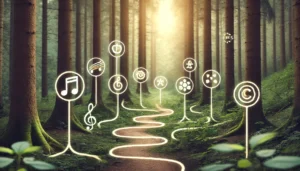There are moments when life feels overwhelming—when the weight of existence seems unbearable, and you feel like you’re lost in a dark, unfamiliar place. It’s what many refer to as the “dark night of the soul,” a time when everything falls apart. During such times, you may feel a profound vulnerability, as if you’re navigating uncharted emotional territory with no clear direction.
This phase can feel isolating and confusing, but you’re not alone. The experience is a natural part of the journey for many, and there are countless methods people turn to for navigating these vulnerable moments.
Facing the Vulnerability of the Dark Night
Many wisdom traditions suggest tools for coping with the dark night: journaling, meditating, or talking to others about what you’re feeling. These are commonly offered solutions to help you stay grounded in a time that feels destabilizing. Journaling, for example, is often encouraged as a way to get your emotions out of your mind and onto paper. You don’t need to solve anything through writing—just observe. The act of putting words on paper allows your feelings to take shape in a way that lets you see them, maybe for the first time.
Similarly, meditation is often advised, not to make the darkness go away, but to help you sit with it. By simply breathing and being present with your discomfort, you begin to see that emotions, no matter how powerful, are transient. They arise and pass away. In these moments, the idea isn’t to force change or “heal” yourself instantly—it’s to gently witness the inner landscape.
But there’s an unspoken challenge to these methods: they all imply that something is “wrong” and needs fixing, that these emotions are obstacles to be overcome.
What If Nothing Needs to Be Fixed?
Here’s where the journey takes a surprising turn. What if, instead of trying to navigate your emotions, journal through them, or meditate them into a more peaceful state, you didn’t need to do anything at all?
This doesn’t mean ignoring your feelings or pretending they don’t exist. Rather, it’s an invitation to recognize that the very idea of needing to “navigate” your vulnerability implies there’s a you that must solve the problem. And this very notion might be the illusion that prolongs the darkness.
Think of it this way: Have you ever watched a child try to force a puzzle piece into the wrong slot? They grow increasingly frustrated because they believe they should be able to make it fit. Yet, when they let go and look at the puzzle with fresh eyes, the solution often becomes clear. In the same way, when you’re trying to “fix” or “navigate” your emotions, it’s like struggling with the puzzle. You’re trying to make something fit in a way that doesn’t match reality.
The Mirror of Projection
One powerful realization that often comes during these times is that your emotions, no matter how much they seem to be about external events or people, are often mirrors. Have you ever found yourself annoyed at someone for resisting change, only to realize later that it was you who was resisting something in your own life?
When you project emotions onto others, labeling them as the cause, you’re missing the opportunity to see that these feelings are revealing your inner state. Recognizing this can feel like a breakthrough, but it also means that all the frustration or pain you experience is pointing back at you. It’s an invitation to stop externalizing and start witnessing.
However, this is where another trap can form. The mind starts thinking: If I stop projecting and own my emotions, I’ll get through this faster. And yet, even this is a form of resistance—a way of trying to control the uncontrollable.
What Is the Truth About Emotions?
If neither projecting emotions nor trying to process them through journaling or meditation brings lasting peace, then what’s the answer? It might sound counterintuitive, but the answer could be that there is no answer. What if the dark night of the soul isn’t something to be solved, healed, or faced at all?
Imagine standing at the edge of a forest at dusk, watching the darkness slowly take over the landscape. There’s a sense of unease—an anticipation of something that might need to be confronted. But what if, instead of walking into that dark forest with the mindset of solving something, you simply watched the night unfold, recognizing that the darkness is just part of the natural cycle? Eventually, dawn breaks, and the darkness disappears, not because you defeated it, but because it was never a true enemy.
Seeing the Dark Night as an Illusion
In much the same way, what if the dark night of the soul is just a concept—an illusion created by the mind that believes it must fight through something? The darkness only feels real because there’s a belief that it must be faced or conquered. But when you see that the “dark night” is just another experience in the flow of life, it begins to dissolve. The mind stops creating stories about what must be done, and what’s left is simply being—without any need for acceptance, resistance, or control.
This realization—that there is no separate “you” who must do anything—might be the ultimate key to moving through the dark night. It’s not about fighting or resolving emotions, and it’s not about ignoring them either. It’s about recognizing that the entire narrative of struggle and resolution is part of the illusion.
Crossing the Illusory Night
As dawn naturally follows the night, the resolution comes not from effort but from seeing through the illusion that the night needed to be “overcome” in the first place. You don’t need to force the dawn, just as you don’t need to force your emotions to change or heal. They will, as all things do, arise and pass on their own.
When you stop believing that you’re in the dark night at all, you realize it’s already day. The night was simply a temporary shadow, an illusion of the mind that believed it needed to fight, fix, or navigate something that was never real to begin with.
Conclusion: There Is No Dark Night
You may still journal, meditate, or talk about your emotions, but now not with the intention to fix anything. These tools can help you witness what’s arising without the need to do anything about them. The truth is that emotions will unfold naturally if left alone. There is no separate “you” who needs to do the accepting.
What’s left is a sense of peace, where the dark night transforms into a simple experience of being—no need to struggle, no need to fix. Daylight is already here.



